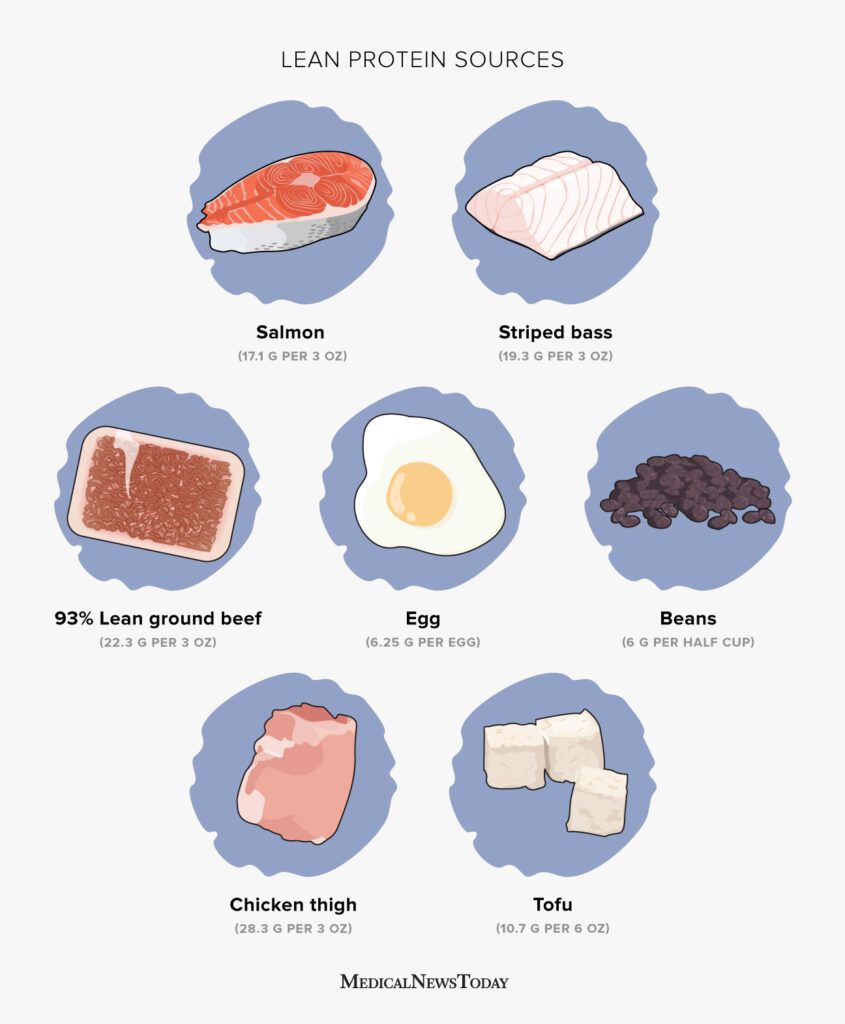Protein is an essential part of a balanced diet. People can get lean protein from animal sources, such as fish and low fat dairy, or from plant foods, such as lentils and legumes.
The U.S. Department of Agriculture’s daily protein recommendation is 5–7 ounce (oz) equivalents. However, the amount of protein a person needs to consume daily will vary depending on their age, weight, overall health, and fitness goals.
People should include a variety of lean protein sources in their diet. For example, while skinless chicken breast is a good source of protein, it does not provide the same fiber and micronutrients as a serving of chickpeas.
This article discusses lean protein sources, including those from animal, dairy, and plant foods.

These involve fish, poultry, and red meat. The American Heart Association (AHA) recommends eating
Fish
According to the AHA, a person should aim to eat
Where possible, choose fish that are rich in omega-3 fatty acids. These healthy fats reduce the risk of cardiovascular disease, which are conditions affecting the heart and blood vessels, such as heart attack and stroke.
Examples of fish rich in omega-3 fat include:
- salmon
- striped bass
- black cod
- bluefish tuna
- mackerel
- whitefish
Below is the protein content of a 3-oz serving of several fish varieties:
- salmon contains
17.1 grams (g) - striped bass contains
19.3 g - Atlantic mackerel contains
15.8 g
Learn more about fish varieties high in omega-3s.
Poultry
Unlike the advisory to eat two servings of fish per week, the AHA does not recommend eating a certain number of poultry servings per week. To avoid saturated fat, a person should choose skinless chicken or turkey.
A small drumstick or thigh is equivalent to a 3-oz serving. The following is the protein content of several pieces of chicken:
- one chicken drumstick without the skin contains
26.1 g - one chicken thigh without the skin contains
28.3 g - two slices of oven-roasted chicken breast contain
7.06 g
Red meat
Red meat — which includes beef, lamb, and pork — contains more saturated fat than other animal protein foods. For this reason, someone who wishes to eat meat should choose the lean, unprocessed variety where possible.
A 3-oz serving of meat is about the size of a deck of cards. An example of a serving is two thin slices of lean roast beef.
Below is the nutrition information of several types of red meat:
The recommendation for dairy intake is
- milk
- cheese
- yogurt
- eggs
While health organizations such as the AHA advise the consumption of nonfat or low fat dairy, it is worth noting that recent research does not support this.
Research from 2019 indicates that full fat dairy products do not have a negative effect on health.
Here is the protein content of several dairy products:
Plant foods that contain protein provide fiber and other nutrients, but they do not contain saturated fat. They
- beans, such as:
- pinto
- soybeans
- black
- garbanzo
- kidney
- peas, such as split peas and black-eyed peas
- lentils
- nuts, such as:
- pecans
- almonds
- walnuts
- peanuts
Below is the protein content of several plant foods:
Many people take protein supplements, but research is not clear about whether they are necessary or beneficial.
A
The authors suggest that individuals get the recommended protein intake from natural food sources rather than supplements, unless an adequate amount of protein is unavailable.
Plant foods are good lean protein sources because they contain fiber and do not have saturated fat. It is a good idea to include a variety of lean protein sources in one’s diet by choosing high fiber plant proteins, fish, and lean meats.
In addition, experts note that nonfat and low fat dairy foods are nutritious protein sources. Full fat dairy foods may also be beneficial. Research suggests that full fat dairy foods may not negatively affect a person’s health.
Individuals who enjoy chicken and turkey should pick skinless varieties to avoid saturated fat. Red meat contains saturated fat, so people should select from varieties that are lean and unprocessed.
